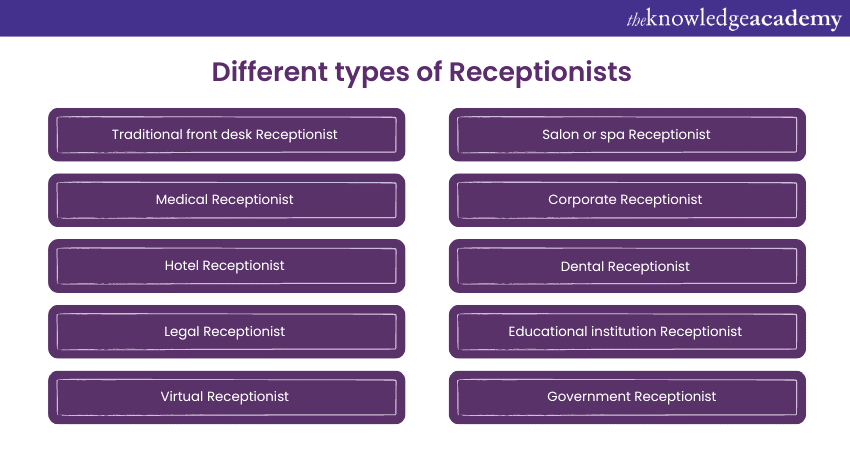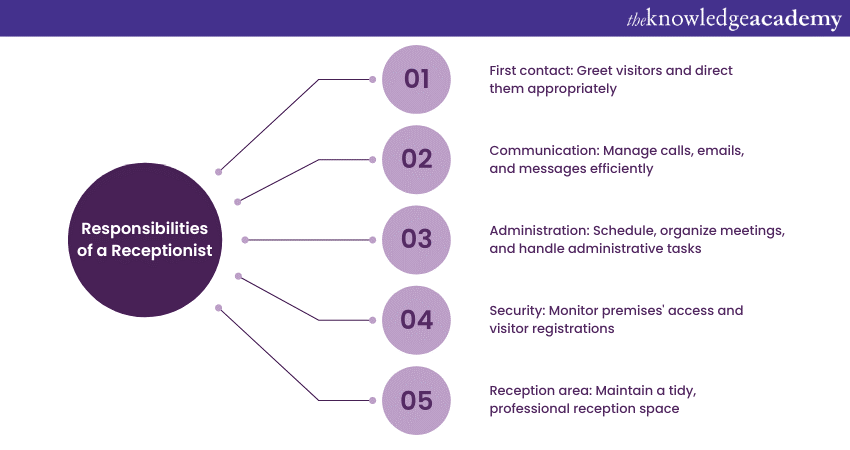We may not have the course you’re looking for. If you enquire or give us a call on +55 8000201623 and speak to our training experts, we may still be able to help with your training requirements.
Training Outcomes Within Your Budget!
We ensure quality, budget-alignment, and timely delivery by our expert instructors.

In the dynamic landscape of modern businesses, Receptionists play a pivotal role as an organisation's welcoming face and efficient organisers. This blog delves into the multifaceted world of ‘Who is a Receptionist’, exploring their diverse responsibilities, distinct types, and the essential skills that empower them. From managing communication channels to fostering positive first impressions, Receptionists are the unsung heroes who ensure the smooth functioning of offices. Join us on a journey to uncover the intricacies of what it truly means to be a Receptionist, shedding light on their crucial contributions to the seamless operation of diverse workplaces.
Table of Contents
1) Who is a Receptionist?
2) Different types of Receptionists
3) Responsibilities of a Receptionist
4) What does a Receptionist do?
5) Skills required for a Receptionist Position
6) Conclusion
Who is a Receptionist?
A Receptionist is a front-line administrative professional responsible for managing the front desk of an organisation. Their primary role involves greeting visitors, answering phone calls, and directing inquiries to the appropriate individuals or departments. Receptionists create the first impression of a company by providing a welcoming and organised environment.
They handle administrative tasks such as sorting and distributing mail, managing appointments, and maintaining office supplies. Effective communication and interpersonal skills are essential, as Receptionists often liaise between clients, employees, and management. In addition to clerical duties, they may handle basic customer service issues and ensure the smooth flow of daily operations in the office.
Different Types of Receptionists
Receptionists play a crucial role in various industries, and their responsibilities can vary based on the organisation's specific needs. Here are the different types of Receptionists:

a) Traditional front desk Receptionists: Found in office settings, they manage phone calls, greet visitors, and handle administrative tasks.
b) Medical Receptionist: In healthcare settings, they schedule appointments, maintain patient records, and ensure a smooth patient flow.
c) Hotel Receptionist: Found in the hospitality industry, they handle guest check-in reservations and provide information about hotel services.
d) Legal Receptionist: In law firms, they manage incoming calls, schedule appointments, and assist with administrative tasks specific to legal settings.
e) Virtual Receptionist: With technological advancements, some businesses use virtual Receptionists to handle calls remotely, often through automated systems or outsourcing.
f) Salon or spa Receptionist: In beauty and wellness establishments, they manage appointments, handle customer inquiries, and support overall salon operations.
g) Corporate Receptionist: In large corporations, they manage front desk operations, greet guests, and coordinate administrative tasks.
h) Dental Receptionist: In dental offices, they schedule appointments, manage patient records, and handle billing inquiries.
i) Educational institution Receptionist: Found in schools or universities, they assist with student inquiries, manage calls, and handle administrative tasks related to education.
j) Government Receptionist: In government offices, they manage public inquiries, schedule appointments, and provide general information about government services.
Enhance your minute-taking skills with our comprehensive Minute Taking Training – boost efficiency and accuracy in documenting crucial meeting details!
Responsibilities of a Receptionist

A Receptionist serves as the initial point of contact for visitors and callers, pivotal in creating a positive and professional first impression for an organisation. The primary responsibilities of a Receptionist are multifaceted. Firstly, they greet and welcome visitors, providing them with essential information and directing them to the appropriate personnel or department. Answering and managing incoming calls is another crucial aspect, as Receptionists act as a central communication hub.
In addition to managing physical and virtual traffic, Receptionists handle administrative tasks. This includes managing appointments, maintaining schedules, and coordinating conference room bookings. They may also receive and sort mail and packages, ensuring timely distribution to the respective recipients within the organisation. Receptionists often assist with basic clerical duties, such as data entry, photocopying, and filing.
Furthermore, a Receptionist must stay attuned to security measures, monitoring and granting access to individuals based on established protocols. Exceptional communication and interpersonal skills are vital for Receptionists as they interact with individuals at all levels, from clients to employees. Overall, the role demands a blend of organisational, communication, and customer service skills to contribute effectively to the smooth operation of the office environment.
Elevate your career as an Executive Personal Assistant with our Perfect Executive Personal Assistant Training – gain the skills to excel in this dynamic role!
What does a Receptionist do?
The following are the main duties performed by a Receptionist:
a) Frontline communication: Receptionists serve as the frontline communication hub for an organisation. They greet visitors, clients, and employees, offering a positive and welcoming first impression.
b) Phone and email management: Managing incoming calls and emails is crucial to a Receptionist's role. They answer inquiries, direct calls to the appropriate personnel, and relay messages efficiently.
c) Appointment scheduling: Receptionists often handle appointment scheduling. They manage calendars, book appointments, and notify staff of schedule changes.
d) Visitor assistance: Receptionists guide and assist visitors to the right departments or individuals. They may issue visitor badges, provide information about the organisation, and ensure a smooth visitor experience.
e) Administrative support: Receptionists provide administrative support by handling tasks such as data entry, filing, and maintaining office supplies. They may also assist with basic bookkeeping duties.
f) Mail handling: Sorting and distributing mail is a common responsibility. Receptionists manage incoming and outgoing mail, ensuring it reaches the correct recipients promptly.
g) Security: Receptionists often play a role in maintaining office security. They monitor access to the premises, verify the identity of visitors, and enforce security protocols.
h) Problem solving: Receptionists need strong problem-solving skills. They address various issues, such as unexpected schedule changes, and find quick and effective solutions.
i) Multitasking: The role requires effective multitasking as Receptionists juggle various responsibilities simultaneously, from answering calls to managing visitor traffic and administrative tasks.
j) Professionalism and etiquette: Displaying professionalism and excellent etiquette is essential. Receptionists represent the organisation, and their demeanour contributes significantly to the overall image and reputation.
k) Technology proficiency: Receptionists often use office software, phone systems, and other technologies. Proficiency in these tools is crucial for efficient communication and task management.
l) Team coordination: They collaborate with other administrative staff and team members to ensure seamless operations. Effective communication within the organisation is a key aspect of their role.
Transform your career with our Administrative Assistant Masterclass – acquire essential skills and strategies to excel in the dynamic world of administrative support!
Skill required for a Receptionist Position
Below is a list of basic skills and competencies you must possess to succeed as a Receptionist:
Typing skills
Typing skills are fundamental for Receptionists, ensuring they can efficiently manage various administrative tasks. Writing quickly and accurately is crucial for handling emails, creating documents, and inputting data into computer systems. Rapid typing allows Receptionists to streamline workflow, responding promptly to inquiries and maintaining organised records. With a focus on touch typing, Receptionists can easily navigate their responsibilities, contributing to the office's overall efficiency.
Technical skills
Receptionists require a range of technical skills to navigate modern office environments. Familiarity with office software, phone systems, and other technical tools is essential. Receptionists often use software for scheduling, email communication, and data entry. Proficiency in these tools ensures the smooth operation of daily tasks, contributing to a well-functioning office. Additionally, technical skills extend to managing office equipment, troubleshooting basic issues, and adapting to new technologies as they emerge. A Receptionist's ability to leverage technical tools enhances productivity and effectiveness in supporting the organization's daily operations.
Customer service
Customer service skills are paramount for a Receptionist, as they are the first point of contact for visitors and callers. A friendly, helpful demeanour creates a positive experience for individuals interacting with the organisation. Receptionists with strong customer service skills can effectively address inquiries, provide information, and assist visitors with a welcoming attitude. Clear communication, active listening, and a customer-centric approach contribute to a positive and professional atmosphere at the front desk. By fostering positive interactions, Receptionists play a crucial role in shaping the overall impression of the organisation.
Interpersonal skills
Interpersonal skills are essential for Receptionists who regularly interact with diverse people, including visitors, clients, and colleagues. Effective interpersonal skills contribute to successful communication, creating a welcoming environment at the front desk. Receptionists with strong interpersonal skills can navigate various personalities, build rapport, and professionally handle inquiries. Clear communication, empathy, and adaptability are key to effective interpersonal interactions. Receptionists who excel in this area contribute to a positive workplace atmosphere where individuals feel valued and well-assisted at the first point of contact.
Unlock your career potential with our PA and Secretarial Courses – empower yourself with essential skills for success in the administrative world!
Conclusion
Hopefully, this blog was able to inform you about Who is a Receptionist alongside their roles, types and responsibilities. The above mentioned skills of a receptionist is vital. Despite being a seemingly menial and straightforward job, being a Receptionist requires a great deal of patience, excellent communication skills and quick-thinking capabilities.
Enhance your professional image and customer service expertise with our Reception Skills Training – the key to creating a positive first impression!
Frequently Asked Questions
Upcoming Business Skills Resources Batches & Dates
Date
 Company Secretary Training Course
Company Secretary Training Course
Fri 10th Jan 2025
Fri 14th Feb 2025
Fri 11th Apr 2025
Fri 23rd May 2025
Fri 8th Aug 2025
Fri 26th Sep 2025
Fri 21st Nov 2025







 Top Rated Course
Top Rated Course



 If you wish to make any changes to your course, please
If you wish to make any changes to your course, please


